The 29th International Conference on Critical Thinking focuses on fostering intellectual discipline. Each conference session is integrally connected with this theme. Click a session title (below) to read a short description of each session.
DAY ONE: July 20th
(participants will choose one of the following sessions)…
- Deep And Surface Learning: Why Students Get Trapped On The Surface; How To Facilitate Deeper Learning… Rush Cosgrove
- The Role Of Self-Reflection And Self-Assessment In Disciplining The Mind…Gerald Nosich
- Fostering Socratic Critical Thinking (While Minimizing Sophistic Critical Thinking)…Richard Paul
- Fostering Close Reading And Substantive Writing Through Critical Thinking…Enoch Hale
- The Role Of Administration In Creating Critical Thinking Communities…Linda Elder
DAY TWO MORNING: July 21st
(participants will choose one of the following sessions)…
- Using The Concepts And Principles Of Critical Thinking To Guide Instruction…Richard Paul
- The Role of Testing and Assessment in Fostering Intellectual Discipline…Gerald Nosich
- Using Peer Assessment To Foster Deep Learning…Linda Elder
- How Great Thinkers Have Learned How To Learn (And What Our Students Can Learn From Them)…Rush Cosgrove
DAY TWO AFTERNOON:
(participants will choose one of the following sessions)…
- Teaching Students To Formulate And Reason Through Essential Questions Within The Disciplines… Gerald Nosich
- Meeting, Facing And Overcoming Barriers To Disciplining The Mind…Linda Elder
- Using Internet Resources To Develop And Foster Critical Thinking…Rush Cosgrove and Dan Blanchard
- Improving Student Learning: Teaching Students How To Study And Learn…Enoch Hale
- Fostering Activated Knowledge: Taking Students Beyond Inert Information And Activated Ignorance…Richard Paul
- Creating a Critical Thinking Elementary School…Thompson School District, Colorado
DAY THREE MORNING July 22nd
(participants will choose from among 20+ one-hour concurrent sessions at the conference)
DAY THREE AFTERNOON
(participants will choose one of the following sessions)…
- Teaching Students To Think Multilogically As They Reason Through Issues Within Subjects And Disciplines…Gerald Nosich
- Using The Critical Thinking Basic Concepts And Understandings Test and the International Critical Thinking Essay Test …Enoch Hale
- Critical Thinking and Human Emotions: Exploring the Role of Critical Thinking In Taking Command of One's Emotional Life…Linda Elder
- Emancipating The Mind Through Critical Thinking…Richard Paul
- The Idea of a Critical Thinking Research University: Combining the Insights of Newman, Humboldt, and Paul/Elder…Rush Cosgrove
DAY FOUR MORNING: July 23rd
(participants will choose one of the following sessions)…
- Overcoming The Barriers To Disciplining The Mind: Bad Habits Of Teaching And Learning…Gerald Nosich
- Issues in Critical Thinking…Richard Paul
- Critical Thinking and Classroom Discipline: Strategies for Keeping Students Intellectually Engaged…Enoch Hale
- Are Critical Societies Possible?…Linda Elder
- Transforming Everyday Experience Through Critical Thinking …Rush Cosgrove
The foundations of critical thinking are the focus of the preconference. First time registrants to the conference are strongly encouraged to attend either of the preconference sessions. A grounding in the foundations is essential to making the conference experience a rich one.
{"id":2558,"title":"","author":"","content":"<p><span>The foundations of critical thinking are the focus of the <a href=\"https://www.criticalthinking.org/Conference/Preconference_2009.cfm\">preconference</a>. First time registrants to the conference are strongly encouraged to attend either of the preconference sessions. A grounding in the foundations is essential to making the conference experience a rich one. </span><br style=\"clear: both;\" /></p>","public_access":"1","public_downloads":"1","sku":"","files":{},"images":{}}
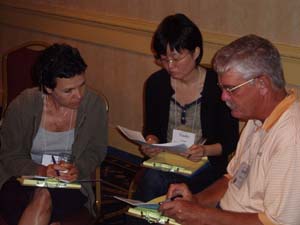
Unlike most academic conferences, the International Conference on Critical Thinking requires intellectual work of all participants in all sessions. One cannot learn critical thinking without doing critical thinking and one cannot do critical thinking without doing intellectual work.
Conference Sessions are designed to help you read, write, and think the ideas of critical thinking into your thinking.
| Active involvement is the key to success at the conference.
Every session will be designed to model effective instruction that systematically engages the intellect of students.
*The Preconference Sessions are two days. When registering you will choose one session for both days |
{"id":2559,"title":"","author":"","content":"<p><img id=\"__mce\" style=\"float: right;\" src=\"https://www.criticalthinking.org/image/pimage/P10101201.jpg\" alt=\"\" /></p>\r\n<table border=\"0\" cellspacing=\"10\" cellpadding=\"10\">\r\n<tbody>\r\n<tr>\r\n<td style=\"padding: 10px; background-color: #ffffcc;\" width=\"50%\"><span>Unlike most academic conferences, the International Conference on Critical Thinking requires intellectual work of all participants in all sessions. One cannot learn critical thinking without doing critical thinking and one cannot do critical thinking without doing intellectual work. <br /> <br /> Conference Sessions are designed to help you read, write, and think the ideas of critical thinking into your thinking. </span> <br /></td>\r\n<td style=\"padding: 10px; background-color: #99ccff;\"><span>Active involvement is the key to success at the conference. <br /> <br /> Every session will be designed to model effective instruction that systematically engages the intellect of students.<br /> <br /> *The <a href=\"https://www.criticalthinking.org/Conference/Preconference_2009.cfm\">Preconference Sessions</a> are two days.&nbsp; When registering you will choose one session for both days</span></td>\r\n</tr>\r\n</tbody>\r\n</table>\r\n<p><br style=\"clear: both;\" /></p>","public_access":"1","public_downloads":"1","sku":"","files":{},"images":{}}
DAY ONE AFTERNOON:
(participants will choose one of the following sessions)…
{"id":2560,"title":"","author":"","content":"<p><span class=\"Title\">DAY ONE AFTERNOON: </span><br /> (participants will choose one of the following sessions)&hellip;<br style=\"clear: both;\" /></p>","public_access":"1","public_downloads":"1","sku":"","files":{},"images":{}}
Deep and Surface Learning: Why Students Get Trapped on the Surface; How to Facilitate Deeper Learning
In this session, Rush Cosgrove will focus on the differences between students whose approach to learning is “deep” and those whose approach is “on the surface.” He will emphasize ways in which we can help students see the difference between the two as they move increasingly toward “deep” learning of content. To support the theoretical approach he is taking, Cosgrove will explore (with participants) some of the current research on students as thinkers. He will show how the tools of critical thinking can be used to move students from a surface to a deep approach.
{"id":2561,"title":"Deep and Surface Learning: Why Students Get Trapped on the Surface; How to Facilitate Deeper Learning","author":"Rush Cosgrove","content":"<p>In this session, Rush Cosgrove will focus on the differences between students whose approach to learning is &ldquo;deep&rdquo; and those whose approach is &ldquo;on the surface.&rdquo; He will emphasize ways in which we can help students see the difference between the two as they move increasingly toward &ldquo;deep&rdquo; learning of content. To support the theoretical approach he is taking, Cosgrove will explore (with participants) some of the current research on students as thinkers. He will show how the tools of critical thinking can be used to move students from a surface to a deep approach.</p>\r\n<p><br style=\"clear: both;\" /></p>","public_access":"1","public_downloads":"1","sku":"","files":{},"images":{}}
The Role of Self-Reflection and Self-Assessment in Disciplining the Mind
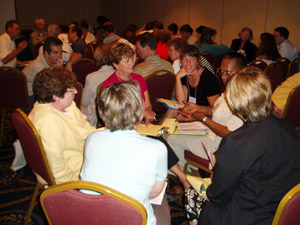
A hallmark of critical thinking is the ability to accurately assess one’s reasoning, to identify problems in it, and then to find ways of transforming any thinking in need of repair. Therefore, becoming skilled at self-reflection and self-assessment are keys to the development of the critical mind. This session will focus on laying down the foundations of critical thinking essential to this development.
For example, asking powerful analytic questions is vital to excellence in thought. When we analyze, we break a whole into parts. We do this because problems in a “whole” are often a function of problems in one or more of its parts. Success in thinking depends, then, on our developing an analytic questioning mind. In doing so, we become skilled at questioning the structures that define the “parts” of thinking: goals and purposes, problems and issues, information and data, inferences and conclusions, concepts and theories, assumptions and beliefs, implications and consequences, viewpoints and perspectives.
Further, we need to develop a deep understanding of intellectual standards and the role they play in the development of critical thought. Intellectual standards are the standards by which thinking is judged by educated and reasonable persons. Yet most people are unaware of these standards. These standards include, but are not limited to: clarity, precision, accuracy, relevance, depth, breadth, logicalness, and fairness. Disciplined thinkers explicitly question using these standards.
This session explores the role of analysis and self assessment in disciplining the mind.
{"id":2562,"title":"The Role of Self-Reflection and Self-Assessment in Disciplining the Mind","author":"Gerald Nosich","content":"<p><img id=\"__mce\" style=\"float: right;\" src=\"https://www.criticalthinking.org/image/pimage/CONF_P1010077.jpg\" alt=\"\" /></p>\r\n<p>A hallmark of critical thinking is the ability to accurately assess one&rsquo;s reasoning, to identify problems in it, and then to find ways of transforming any thinking in need of repair. Therefore, becoming skilled at self-reflection and self-assessment are keys to the development of the critical mind. This session will focus on laying down the foundations of critical thinking essential to this development. <br /> <br /> For example, asking powerful analytic questions is vital to excellence in thought. When we analyze, we break a whole into parts. We do this because problems in a &ldquo;whole&rdquo; are often a function of problems in one or more of its parts. Success in thinking depends, then, on our developing an analytic questioning mind. In doing so, we become skilled at questioning the structures that define the &ldquo;parts&rdquo; of thinking: goals and purposes, problems and issues, information and data, inferences and conclusions, concepts and theories, assumptions and beliefs, implications and consequences, viewpoints and perspectives.<br /> <br /> Further, we need to develop a deep understanding of intellectual standards and the role they play in the development of critical thought. Intellectual standards are the standards by which thinking is judged by educated and reasonable persons. Yet most people are unaware of these standards. These standards include, but are not limited to: clarity, precision, accuracy, relevance, depth, breadth, logicalness, and fairness. Disciplined thinkers explicitly question using these standards. <br /> <br /> This session explores the role of analysis and self assessment in disciplining the mind.</p>\r\n<p><br style=\"clear: both;\" /></p>","public_access":"1","public_downloads":"1","sku":"","files":{},"images":{}}
Fostering Socratic Critical Thinking (While Minimizing Sophistic Critical Thinking)
Socratic critical thinkers are skilled thinkers who use the skills of critical thinking to develop and foster fairminded reasoning and thought. They avoid the use of deception and manipulation in dealing with others. The ‘Socratic critical thinker’ contrasts with the ‘sophistic critical thinker;’ the first using the tools of critical thinking in a fairminded way; the second using the tools of critical thinking selfishly (or otherwise to manipulate).
Further, there are two senses of the term ‘Socratic critical thinkers:’ 1) one skilled at asking pertinent questions and who routinely uses questioning as an essential tool for learning and communication, 2) one concerned with using the skills of reasoning to live an examined, ethical life.
This session, then, will focus on the differences between an approach to critical thinking that is “Socratic” and one which is “sophistic.” Emphasis will be placed on ways in which we can help students see the difference between the two (while recognizing their overlap).
{"id":2563,"title":"Fostering Socratic Critical Thinking (While Minimizing Sophistic Critical Thinking)","author":"Richard Paul","content":"<p>Socratic critical thinkers are skilled thinkers who use the skills of critical thinking to develop and foster fairminded reasoning and thought. They avoid the use of deception and manipulation in dealing with others. The &lsquo;Socratic critical thinker&rsquo; contrasts with the &lsquo;sophistic critical thinker;&rsquo; the first using the tools of critical thinking in a fairminded way; the second using the tools of critical thinking selfishly (or otherwise to manipulate). <br /> <br /> Further, there are two senses of the term &lsquo;Socratic critical thinkers:&rsquo; 1) one skilled at asking pertinent questions and who routinely uses questioning as an essential tool for learning and communication, 2) one concerned with using the skills of reasoning to live an examined, ethical life. <br /> <br /> This session, then, will focus on the differences between an approach to critical thinking that is &ldquo;Socratic&rdquo; and one which is &ldquo;sophistic.&rdquo; Emphasis will be placed on ways in which we can help students see the difference between the two (while recognizing their overlap).</p>\r\n<p><br style=\"clear: both;\" /></p>","public_access":"1","public_downloads":"1","sku":"","files":{},"images":{}}
Fostering Close Reading and Substantive Writing Through Critical Thinking
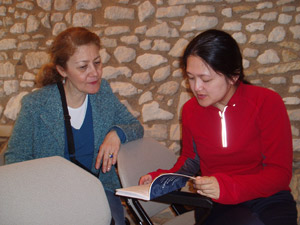
Educated persons are skilled at and routinely engage in close reading and substantive writing. When reading, they seek to learn from texts; they generate questions as they read and seek answers to those questions by reading widely and skillfully. In short, they seek to become better educated through reading. They do this through the process of intellectually interacting with the authors they read, as they read. They come to understand what they read by paraphrasing, elaborating, exemplifying, and illustrating what they read. They make connections as they read. They evaluate as they read. They bring important ideas into their thinking as they read.
Substantive writing, in turn, consists in focusing on a subject worth writing about and then saying something worth saying about it. It enhances our reading. It develops the more subjects we read and write about and the more points of view we use as tools for discovering important points. Whenever we read to acquire knowledge, we should write to take ownership of that reading. Furthermore, just as we must write to gain an initial understanding of the primary ideas of a subject, so also must we write to begin to think within the subject as a whole and to make interconnections between ideas within and beyond the subject. Quite remarkably, many of our students have never read a text closely, nor written a substantive paper in all their years of schooling. Instead, they have developed the habit of skirting by with superficial and impressionistic reading, writing, and listening. This session will explore ways and means for developing student skills in close reading and substantive writing in content areas.
{"id":2564,"title":"Fostering Close Reading and Substantive Writing Through Critical Thinking","author":"Enoch Hale","content":"<p><img id=\"__mce\" style=\"float: right;\" src=\"https://www.criticalthinking.org/image/pimage/CONF_P1010032.jpg\" alt=\"\" /></p>\r\n<p>Educated persons are skilled at and routinely engage in close reading and substantive writing. When reading, they seek to learn from texts; they generate questions as they read and seek answers to those questions by reading widely and skillfully. In short, they seek to become better educated through reading. They do this through the process of intellectually interacting with the authors they read, as they read. They come to understand what they read by paraphrasing, elaborating, exemplifying, and illustrating what they read. They make connections as they read. They evaluate as they read. They bring important ideas into their thinking as they read. <br /> <br /> Substantive writing, in turn, consists in focusing on a subject worth writing about and then saying something worth saying about it. It enhances our reading. It develops the more subjects we read and write about and the more points of view we use as tools for discovering important points. Whenever we read to acquire knowledge, we should write to take ownership of that reading. Furthermore, just as we must write to gain an initial understanding of the primary ideas of a subject, so also must we write to begin to think within the subject as a whole and to make interconnections between ideas within and beyond the subject. Quite remarkably, many of our students have never read a text closely, nor written a substantive paper in all their years of schooling. Instead, they have developed the habit of skirting by with superficial and impressionistic reading, writing, and listening. This session will explore ways and means for developing student skills in close reading and substantive writing in content areas.</p>\r\n<p><br style=\"clear: both;\" /></p>","public_access":"1","public_downloads":"1","sku":"","files":{},"images":{}}
The Role of Administration in Creating Critical Thinking Communities
Critical thinking, deeply understood, provides a rich set of concepts that enable us to think our way through any subject or discipline, through any problem or issue. With a substantive concept of critical thinking clearly in mind, we begin to see the pressing need for a staff development program that fosters critical thinking within and across the curriculum. As we come to understand a substantive concept of critical thinking, we are able to follow-out its implications in designing a professional development program. By means of it, we begin to see important implications for every part of the institution –redesigning policies, providing administrative support for critical thinking, rethinking the mission, coordinating and providing faculty workshops in critical thinking, redefining faculty as learners as well as teachers, assessing students, faculty, and the institution as a whole in terms of critical thinking abilities and traits. We realize that robust critical thinking should be the guiding force for all of our educational efforts. This session presents a professional development model that can provide the vehicle for deep change across the curriculum, across the institution.
{"id":2565,"title":"The Role of Administration in Creating Critical Thinking Communities","author":"Linda Elder","content":"<p>Critical thinking, deeply understood, provides a rich set of concepts that enable us to think our way through any subject or discipline, through any problem or issue. With a substantive concept of critical thinking clearly in mind, we begin to see the pressing need for a staff development program that fosters critical thinking within and across the curriculum. As we come to understand a substantive concept of critical thinking, we are able to follow-out its implications in designing a professional development program. By means of it, we begin to see important implications for every part of the institution &ndash;redesigning policies, providing administrative support for critical thinking, rethinking the mission, coordinating and providing faculty workshops in critical thinking, redefining faculty as learners as well as teachers, assessing students, faculty, and the institution as a whole in terms of critical thinking abilities and traits. We realize that robust critical thinking should be the guiding force for all of our educational efforts. This session presents a professional development model that can provide the vehicle for deep change across the curriculum, across the institution.</p>\r\n<p><br style=\"clear: both;\" /></p>","public_access":"1","public_downloads":"1","sku":"","files":{},"images":{}}
DAY TWO MORNING:
(participants will choose one of the following sessions)…
{"id":2566,"title":"","author":"","content":"<p><span class=\"Title\">DAY TWO MORNING: </span><br /> (participants will choose one of the following sessions)&hellip; <br /><br style=\"clear: both;\" /></p>","public_access":"1","public_downloads":"1","sku":"","files":{},"images":{}}
Using the Concepts and Principles of Critical Thinking to Guide Instruction
In this session, Richard Paul will focus on how we can use our conceptualization of the concepts and principles of critical thinking as tools for improving instruction and learning. Part of what Paul will argue is that we are helped or hindered by our conceptualization of critical thinking. He strongly supports the development of conceptualizations of critical thinking that are global, systematic, explicit, and Socratic. At the same time, he argues that we should develop a deepening interest in the specialized intellectual constructs created and used by professionals to engage in critical thinking within particular disciplines. Paul will emphasize ways in which we can help students become more global, systematic, and explicit critical thinkers while they are developing simultaneously as “intra-disciplinary” thinkers within a core academic discipline.
{"id":2567,"title":"Using the Concepts and Principles of Critical Thinking to Guide Instruction","author":"Richard Paul","content":"<p>In this session, Richard Paul will focus on how we can use our conceptualization of the concepts and principles of critical thinking as tools for improving instruction and learning. Part of what Paul will argue is that we are helped or hindered by our conceptualization of critical thinking. He strongly supports the development of conceptualizations of critical thinking that are global, systematic, explicit, and Socratic. At the same time, he argues that we should develop a deepening interest in the specialized intellectual constructs created and used by professionals to engage in critical thinking within particular disciplines. Paul will emphasize ways in which we can help students become more global, systematic, and explicit critical thinkers while they are developing simultaneously as &ldquo;intra-disciplinary&rdquo; thinkers within a core academic discipline.</p>\r\n<p><br style=\"clear: both;\" /></p>","public_access":"1","public_downloads":"1","sku":"","files":{},"images":{}}
The Role of Testing and Assessment in Fostering Intellectual Discipline

The purpose of assessment in instruction is improvement. The purpose of assessing instruction for critical thinking is improving the teaching of discipline-based thinking (historical, biological, sociological, mathematical thinking…). It is to improve students’ abilities to think their way through content, using disciplined skill in reasoning. The more particular we can be about what we want students to learn about critical thinking, the better can we devise instruction to serve that particular purpose.
Unfortunately, standardized tests now widely used in critical thinking are not designed to impact instruction. There is a significant disconnect between what standardized tests assess and what we want students to learn. This session will focus on the integration of assessment and critical thinking across the curriculum. It will also introduce participants to some of the critical thinking assessment tools offered by the Foundation for Critical Thinking.
This workshop is designed for faculty and administrators at the high school, community college, college and university levels. Click Here for our white paper on testing and assessment
{"id":2568,"title":"The Role of Testing and Assessment in Fostering Intellectual Discipline","author":"Gerald Nosich","content":"<p><img id=\"__mce\" style=\"float: right;\" src=\"https://www.criticalthinking.org/image/pimage/CONF_P1010024.jpg\" alt=\"\" /></p>\r\n<p>The purpose of assessment in instruction is improvement. The purpose of assessing instruction for critical thinking is improving the teaching of discipline-based thinking (historical, biological, sociological, mathematical thinking&hellip;). It is to improve students&rsquo; abilities to think their way through content, using disciplined skill in reasoning. The more particular we can be about what we want students to learn about critical thinking, the better can we devise instruction to serve that particular purpose. <br /> <br /> Unfortunately, standardized tests now widely used in critical thinking are not designed to impact instruction. There is a significant disconnect between what standardized tests assess and what we want students to learn. This session will focus on the integration of assessment and critical thinking across the curriculum. It will also introduce participants to some of the critical thinking assessment tools offered by the Foundation for Critical Thinking. <br /> <br /> This workshop is designed for faculty and administrators at the high school, community college, college and university levels. <a href=\"https://www.criticalthinking.org/files/White%20PaperAssessmentSept2007.pdf\">Click Here for our white paper on testing and assessment&nbsp;</a></p>\r\n<p><br style=\"clear: both;\" /></p>","public_access":"1","public_downloads":"1","sku":"","files":{},"images":{}}
Using Peer Assessment to Foster Deep Learning
To acquire substantive knowledge, students need: 1) engagement in the active construction of knowledge and 2) constructive feedback for that construction. This session will focus on the second half of this need: the reception of constructive feedback. Students can learn how to improve their own thinking and that of others by learning simple techniques for giving constructive feedback. This session will focus on how to get students to give constructive feedback that helps others as they expand their knowledge and insight by getting constructive feedback from those others. By this means, students can learn how to help other students to think more clearly, accurately, precisely, relevantly, deeply, broadly, logically, and fairly (as they learn how to do so themselves).
{"id":2569,"title":"Using Peer Assessment to Foster Deep Learning","author":"Linda Elder","content":"<p>To acquire substantive knowledge, students need: 1) engagement in the active construction of knowledge and 2) constructive feedback for that construction. This session will focus on the second half of this need: the reception of constructive feedback. Students can learn how to improve their own thinking and that of others by learning simple techniques for giving constructive feedback. This session will focus on how to get students to give constructive feedback that helps others as they expand their knowledge and insight by getting constructive feedback from those others. By this means, students can learn how to help other students to think more clearly, accurately, precisely, relevantly, deeply, broadly, logically, and fairly (as they learn how to do so themselves).</p>\r\n<p><br style=\"clear: both;\" /></p>","public_access":"1","public_downloads":"1","sku":"","files":{},"images":{}}
How Great Thinkers Have Learned How to Learn (and What Our Students Can Learn From Them)
In this session, Rush Cosgrove will focus on examples drawn from the history of some “great thinkers” to illustrate how these thinkers used critical thinking constructs to develop their thinking, and the thinking within their particular fields of study. Participants will work in small groups to share examples from the history of their own academic fields. Participants will be encouraged to think through implications of these “histories” for instruction and student learning.
{"id":2570,"title":"How Great Thinkers Have Learned How to Learn (and What Our Students Can Learn From Them) ","author":"Rush Cosgrove","content":"<p>In this session, Rush Cosgrove will focus on examples drawn from the history of some &ldquo;great thinkers&rdquo; to illustrate how these thinkers used critical thinking constructs to develop their thinking, and the thinking within their particular fields of study. Participants will work in small groups to share examples from the history of their own academic fields. Participants will be encouraged to think through implications of these &ldquo;histories&rdquo; for instruction and student learning.</p>\r\n<p><br style=\"clear: both;\" /></p>","public_access":"1","public_downloads":"1","sku":"","files":{},"images":{}}
DAY TWO AFTERNOON:
(participants will choose one of the following sessions)…
{"id":2571,"title":"","author":"","content":"<p><span style=\"font-family: Verdana,Geneva,Arial,Helvetica,sans-serif; color: #3366ff; font-weight: bold;\"><span class=\"Title\">DAY TWO AFTERNOON: </span></span><br /> (participants will choose one of the following sessions)&hellip;</p>\r\n<p><br style=\"clear: both;\" /></p>","public_access":"1","public_downloads":"1","sku":"","files":{},"images":{}}
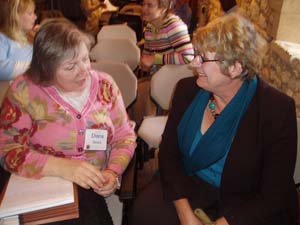
It is not possible to be a good thinker and a poor questioner. Questions define tasks, express problems, and delineate issues. They drive thinking forward. Answers, on the other hand, often signal a full stop in thought. Only when an answer generates further questions does thought continue as inquiry. A mind with no questions is a mind that is not intellectually alive. No questions (asked) equals no understanding (achieved). Superficial questions equal superficial understanding, unclear questions equal unclear understanding. If your mind is not actively generating questions, you are not engaged in substantive learning.
So the question is raised, “How can we teach so that students generate questions that lead to deep learning?” In this session we shall focus on practical strategies for generating questioning minds---at the same time, of course, that students learn the content that is at the heart of the curriculum.
{"id":2572,"title":"Teaching Students to Formulate and Reason Through Essential Questions Within the Disciplines","author":"Gerald Nosich","content":"<p><img id=\"__mce\" style=\"float: right;\" src=\"https://www.criticalthinking.org/image/pimage/P1010055.jpg\" alt=\"\" /></p>\r\n<p>It is not possible to be a good thinker and a poor questioner. Questions define tasks, express problems, and delineate issues. They drive thinking forward. Answers, on the other hand, often signal a full stop in thought. Only when an answer generates further questions does thought continue as inquiry. A mind with no questions is a mind that is not intellectually alive. No questions (asked) equals no understanding (achieved). Superficial questions equal superficial understanding, unclear questions equal unclear understanding. If your mind is not actively generating questions, you are not engaged in substantive learning. <br /> <br /> So the question is raised, &ldquo;How can we teach so that students generate questions that lead to deep learning?&rdquo; In this session we shall focus on practical strategies for generating questioning minds---at the same time, of course, that students learn the content that is at the heart of the curriculum.</p>\r\n<p><br style=\"clear: both;\" /></p>","public_access":"1","public_downloads":"1","sku":"","files":{},"images":{}}
Meeting, Facing and Overcoming Barriers to Disciplining the Mind
To reason well, we must understand, not only the tools and concepts that critical thinking offers, but also the powerful barriers to good reasoning that exist naturally in the mind. This session will target some of those barriers. The session will focus, for example, on self-deception, bias, prejudice, distortion of information and ideas, intellectual arrogance, intellectual hypocrisy, narrow mindedness, and stereotyping. We will utilize a theory of mind which can help you, and your students, become more aware of the native egocentric tendencies that operate in the mind and that keep us from reaching our potential as thinkers.
{"id":2573,"title":"Meeting, Facing and Overcoming Barriers to Disciplining the Mind","author":"Linda Elder","content":"<p>To reason well, we must understand, not only the tools and concepts that critical thinking offers, but also the powerful barriers to good reasoning that exist naturally in the mind. This session will target some of those barriers. The session will focus, for example, on self-deception, bias, prejudice, distortion of information and ideas, intellectual arrogance, intellectual hypocrisy, narrow mindedness, and stereotyping. We will utilize a theory of mind which can help you, and your students, become more aware of the native egocentric tendencies that operate in the mind and that keep us from reaching our potential as thinkers.</p>\r\n<p><br style=\"clear: both;\" /></p>","public_access":"1","public_downloads":"1","sku":"","files":{},"images":{}}
Using Internet Resources to Develop and Foster Critical Thinking
Internet resources and communication increasingly influence our thinking, and the thinking of our students. There is a virtual world of resources through the internet that can either detract from, or potentially foster, critical thinking. This session will focus on ways of using internet resources for developing one’s critical thinking abilities. The internet resources of the Foundation for Critical Thinking will be highlighted, along with lectures through sources such as the University of Oxford.
{"id":2574,"title":"Using Internet Resources to Develop and Foster Critical Thinking","author":"Rush Cosgrove","content":"<p>Internet resources and communication increasingly influence our thinking, and the thinking of our students. There is a virtual world of resources through the internet that can either detract from, or potentially foster, critical thinking. This session will focus on ways of using internet resources for developing one&rsquo;s critical thinking abilities. The internet resources of the Foundation for Critical Thinking will be highlighted, along with lectures through sources such as the University of Oxford.</p>\r\n<p><br style=\"clear: both;\" /></p>","public_access":"1","public_downloads":"1","sku":"","files":{},"images":{}}
Improving Student Learning: Teaching Students How to Study and Learn
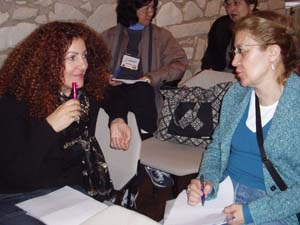
To study well and learn any subject is to learn how to think with discipline within that subject. It is to learn to think within its logic, to:
- raise vital questions and problems within it, formulating them clearly and precisely.
- gather and assess information, using ideas to interpret that information insightfully.
- come to well-reasoned conclusions and solutions, testing them against relevant criteria and standards.
- adopt the point of view of the discipline, recognizing and assessing, as need be, its assumptions, implications, and practical consequences.
- communicate effectively with others using the language of the discipline and that of educated public discourse.
- relate what one is learning in the subject to other subjects and to what is significant in human life.
To become a skilled learner is to become a self-directed, self-disciplined, self-monitored, and self-corrective thinker who has given assent to rigorous standards of thought and mindful command of their use. Skilled learning of a discipline requires that one respect the power of it, as well as its, and one’s own, historical and human limitations. This session will offer strategies for helping students begin to take learning seriously.
This session focuses on a number of instructional ideas that are based in the idea that substantive teaching and learning can occur only when students take ownership of the most basic principles and concepts of the subject. These strategies are rooted in a vision of instruction implied by critical thinking and an analysis of the weaknesses typically found in most traditional didactic lecture/quiz/test formats of instruction. This session, then focuses on some basic instructional strategies that foster the development of student thinking, and strategies that require students to think actively within the concepts and principles of the subject
{"id":2575,"title":"Improving Student Learning: Teaching Students How to Study and Learn","author":"Enoch Hale","content":"<p><img id=\"__mce\" style=\"float: right;\" src=\"https://www.criticalthinking.org/image/pimage/P1010050.jpg\" alt=\"\" /></p>\r\n<p>To study well and learn any subject is to learn how to think with discipline within that subject. It is to learn to think within its logic, to:</p>\r\n<ul>\r\n<li>raise vital questions and problems within it, formulating them clearly and precisely.</li>\r\n<li>gather and assess information, using ideas to interpret that information insightfully.</li>\r\n<li>come to well-reasoned conclusions and solutions, testing them against relevant criteria and standards.</li>\r\n<li>adopt the point of view of the discipline, recognizing and assessing, as need be, its assumptions, implications, and practical consequences.</li>\r\n<li>communicate effectively with others using the language of the discipline and that of educated public discourse.</li>\r\n<li>relate what one is learning in the subject to other subjects and to what is significant in human life.</li>\r\n</ul>\r\n<p>To become a skilled learner is to become a self-directed, self-disciplined, self-monitored, and self-corrective thinker who has given assent to rigorous standards of thought and mindful command of their use. Skilled learning of a discipline requires that one respect the power of it, as well as its, and one&rsquo;s own, historical and human limitations. This session will offer strategies for helping students begin to take learning seriously.<br /> This session focuses on a number of instructional ideas that are based in the idea that substantive teaching and learning can occur only when students take ownership of the most basic principles and concepts of the subject. These strategies are rooted in a vision of instruction implied by critical thinking and an analysis of the weaknesses typically found in most traditional didactic lecture/quiz/test formats of instruction. This session, then focuses on some basic instructional strategies that foster the development of student thinking, and strategies that require students to think actively within the concepts and principles of the subject</p>\r\n<p><br style=\"clear: both;\" /></p>","public_access":"1","public_downloads":"1","sku":"","files":{},"images":{}}
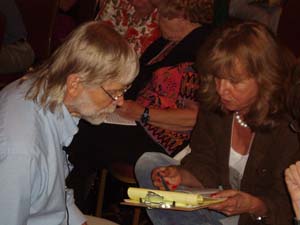
Activated knowledge entails taking into the mind, and actively using, information that is not only true but, when insightfully understood, leads the thinker by implication to more knowledge, deeper understandings, and rational actions. Education should lead to the developing of activated knowledge, when instead it often fosters activated ignorance or inert information. Consider the study of history, for example. Many students do no more than memorize isolated statements in the history textbook so as to pass exams. Some of these statements—the ones they don’t understand and could not explain—become part of the students’ battery of inert information. Other statements—the ones they misunderstand and wrongly explain (but believe to be true) —become part of the students’ battery of activated ignorance.
This session will focus on designing instruction to foster activated knowledge, rather than inert information and activated ignorance.
{"id":2576,"title":"Fostering Activated Knowledge: Taking Students Beyond Inert Information and Activated Ignorance","author":"Richard Paul","content":"<p><img id=\"__mce\" style=\"float: right;\" src=\"https://www.criticalthinking.org/image/pimage/PPL10101151.jpg\" alt=\"\" /></p>\r\n<p>Activated knowledge entails taking into the mind, and actively using, information that is not only true but, when insightfully understood, leads the thinker by implication to more knowledge, deeper understandings, and rational actions. Education should lead to the developing of activated knowledge, when instead it often fosters activated ignorance or inert information. Consider the study of history, for example. Many students do no more than memorize isolated statements in the history textbook so as to pass exams. Some of these statements&mdash;the ones they don&rsquo;t understand and could not explain&mdash;become part of the students&rsquo; battery of inert information. Other statements&mdash;the ones they misunderstand and wrongly explain (but believe to be true) &mdash;become part of the students&rsquo; battery of activated ignorance. <br /> <br /> This session will focus on designing instruction to foster activated knowledge, rather than inert information and activated ignorance.</p>\r\n<p><br style=\"clear: both;\" /></p>","public_access":"1","public_downloads":"1","sku":"","files":{},"images":{}}
Creating a Critical Thinking Elementary School
Children cannot develop as critical thinkers unless they are in an environment which cultivates critical thinking in its every dimension. It is important for the entire school community to become committed to critical thinking. This session outlines a detailed long-term school development plan that has emerged from eight years of use in the Thompson School District. The session will focus on principal development, teacher development, parent involvement, school-wide professional development, as well as specific instructional and curriculum implications for the classroom. Only through a comprehensive approach can we ensure successful implementation and long-term sustainability of critical thinking.
{"id":2577,"title":"Creating a Critical Thinking Elementary School","author":"Paul Bankes, Carmen Polka, Robert Raney, Thompson School District, Colorado","content":"<p>Children cannot develop as critical thinkers unless they are in an environment which cultivates critical thinking in its every dimension. It is important for the entire school community to become committed to critical thinking. This session outlines a detailed long-term school development plan that has emerged from eight years of use in the Thompson School District. The session will focus on principal development, teacher development, parent involvement, school-wide professional development, as well as specific instructional and curriculum implications for the classroom. Only through a comprehensive approach can we ensure successful implementation and long-term sustainability of critical thinking.</p>\r\n<p><br style=\"clear: both;\" /></p>","public_access":"1","public_downloads":"1","sku":"","files":{},"images":{}}
DAY THREE MORNING - Concurrent Sessions
Participants will choose from among 20+ one-hour concurrent sessions at the conference. You will receive information and abstracts from the presenters in the registration packets at the conference.
{"id":2578,"title":"","author":"","content":"<p><span class=\"Title\">DAY THREE MORNING - Concurrent Sessions</span><br /> <br /> <span>Participants will choose from among 20+ one-hour concurrent sessions at the conference. You will receive information and abstracts from the presenters in the registration packets at the conference. <br /> </span></p>\r\n<p><br style=\"clear: both;\" /></p>","public_access":"1","public_downloads":"1","sku":"","files":{},"images":{}}
DAY THREE AFTERNOON
(participants will choose one of the following sessions)…
{"id":2579,"title":"","author":"","content":"<p><span class=\"Title\">DAY THREE AFTERNOON </span><br /> (participants will choose one of the following sessions)&hellip;</p>\r\n<p><br style=\"clear: both;\" /></p>","public_access":"1","public_downloads":"1","sku":"","files":{},"images":{}}
Teaching Students to Think Multilogically as They Reason Through Issues Within Subjects and Disciplines
When we foster multilogical thinking in the classroom, we foster students’ abilities to sympathetically enter into, consider, and reason within multiple points of view. Most significant human issues require multilogical thinking. They are non-atomic issues inextricably joined to other issues, with some conceptual messiness to them, often with important values lurking in the background. When the issues have an empirical dimension, they tend to be controversial. In dealing with multilogical problems, people often disagree about how some of the facts relevant to it should be interpreted and how their significance should be determined. When these problems have a conceptual dimension, the concepts usually can be pinned down in different ways. Thus, the ability to reason multilogically is essential to critical thinking.
A student who is comfortable thinking through multilogical problems is comfortable thinking within multiple perspectives, engaging in dialogical and dialectical thinking, practicing intellectual empathy, and thinking across disciplines and domains. This session will focus on teaching students to reason through multilogical issues in any subject, discipline, or domain of human thought.
{"id":2580,"title":"Teaching Students to Think Multilogically as They Reason Through Issues Within Subjects and Disciplines","author":"Gerald Nosich","content":"<p>When we foster multilogical thinking in the classroom, we foster students&rsquo; abilities to <em>sympathetically enter into, consider, and reason within multiple points of view</em>. Most significant human issues require multilogical thinking. They are non-atomic issues inextricably joined to other issues, with some conceptual messiness to them, often with important values lurking in the background. When the issues have an empirical dimension, they tend to be controversial. In dealing with multilogical problems, people often disagree about how some of the facts relevant to it should be interpreted and how their significance should be determined. When these problems have a conceptual dimension, the concepts usually can be pinned down in different ways. Thus, the ability to reason multilogically is essential to critical thinking.<br /> <br /> A student who is comfortable thinking through multilogical problems is comfortable thinking within multiple perspectives, engaging in dialogical and dialectical thinking, practicing intellectual empathy, and thinking across disciplines and domains. This session will focus on teaching students to reason through multilogical issues in any subject, discipline, or domain of human thought.</p>\r\n<p><br style=\"clear: both;\" /></p>","public_access":"1","public_downloads":"1","sku":"","files":{},"images":{}}
Using the Critical Thinking Basic Concepts and Understandings Test and the International Critical Thinking Essay Test
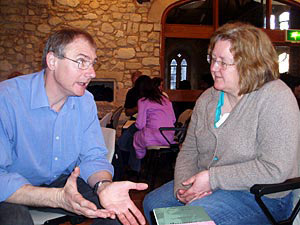
This session will focus on two assessment tools offered through the Foundation for Critical Thinking - The International Critical Thinking Basic Concepts and Understandings Test and the International Critical Thinking Essay Test - which can be used in conjunction with one another.
The International Critical Thinking Basic Concepts and Understandings Test, available for use online, is a foundational critical thinking concepts and principles test. It approaches critical thinking as a trans-disciplinary system of interconnected concepts, principles, and understandings. It focuses on the five essential dimensions of critical thinking:
- the analysis of thought.
- the assessment of thought
- the dispositions of thought
- the skills and abilities of thought
- the obstacles or barriers to critical thought.
The International Critical Thinking Essay Test assesses student abilities to analyze and assess reasoning and can be used in any academic subject or discipline, using subject-specific content. Both tests are designed for use at the high school level (grade 10) and above (college, university, graduate level). Click Here for our white paper on testing and assessment
{"id":2581,"title":"Using the Critical Thinking Basic Concepts and Understandings Test and the International Critical Thinking Essay Test","author":"Enoch Hale","content":"<p><img id=\"__mce\" style=\"float: right;\" src=\"https://www.criticalthinking.org/image/pimage/CONF_image0011.jpg\" alt=\"\" /></p>\r\n<p>This session will focus on two assessment tools offered through the Foundation for Critical Thinking - The International Critical Thinking Basic Concepts and Understandings Test and the International Critical Thinking Essay Test - which can be used in conjunction with one another.<br /> The International Critical Thinking Basic Concepts and Understandings Test, available for use online, is a foundational critical thinking concepts and principles test. It approaches critical thinking as a trans-disciplinary system of interconnected concepts, principles, and understandings. It focuses on the five essential dimensions of critical thinking:</p>\r\n<ol>\r\n<li>the analysis of thought.</li>\r\n<li>the assessment of thought</li>\r\n<li>the dispositions of thought</li>\r\n<li>the skills and abilities of thought</li>\r\n<li>the obstacles or barriers to critical thought.</li>\r\n</ol>\r\n<p>The International Critical Thinking Essay Test assesses student abilities to analyze and assess reasoning and can be used in any academic subject or discipline, using subject-specific content. Both tests are designed for use at the high school level (grade 10) and above (college, university, graduate level). <a href=\"/files/White%20PaperAssessmentSept2007.pdf\">Click Here for our white paper on testing and assessment </a></p>\r\n<p><br style=\"clear: both;\" /></p>","public_access":"1","public_downloads":"1","sku":"","files":{},"images":{}}
Critical Thinking and Human Emotions: Exploring the Role of Critical Thinking in Taking Command of One’s Emotional Life
To take command of one’s emotional life is to achieve command of the workings of one’s mind. It is our minds that generate our thought, feelings, and desires. It is our students’ minds that control not only how they study and learn, but how they make decisions and conduct their lives. Part of understanding the role of critical thinking is enabling us to understand the relationship between thoughts and emotions. To be in command of one’s emotional life is to have command of the faculties of mind that determine it:; thoughts, emotions, and desires working together. Student emotions play an important part in their lives as students. When they bring learned indifference, irrational fears, acquired hostility, and inflexible ideas into the classroom, their learning is limited to the superficial. This session provides a structure for helping students improve the quality of their work and lives.
{"id":2582,"title":"Critical Thinking and Human Emotions: Exploring the Role of Critical Thinking in Taking Command of One’s Emotional Life","author":"Linda Elder","content":"<p>To take command of one&rsquo;s emotional life is to achieve command of the workings of one&rsquo;s mind. It is our minds that generate our thought, feelings, and desires. It is our students&rsquo; minds that control not only how they study and learn, but how they make decisions and conduct their lives. Part of understanding the role of critical thinking is enabling us to understand the relationship between thoughts and emotions. To be in command of one&rsquo;s emotional life is to have command of the faculties of mind that determine it:; thoughts, emotions, and desires working together. Student emotions play an important part in their lives as students. When they bring learned indifference, irrational fears, acquired hostility, and inflexible ideas into the classroom, their learning is limited to the superficial. This session provides a structure for helping students improve the quality of their work and lives.</p>\r\n<p><br style=\"clear: both;\" /></p>","public_access":"1","public_downloads":"1","sku":"","files":{},"images":{}}
Emancipating the Mind Through Critical Thinking
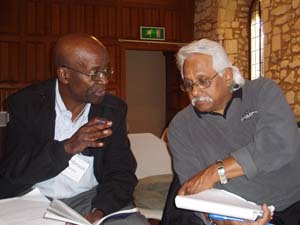
Most people are trapped in their beliefs. They use ideas in their thinking that they are unaware of and have never examined for quality. They have developed a world view which influences much of their behavior, but of which they have little or no understanding. They are using assumptions accumulated throughout their lives which lead to their inferences and conclusions, but which they themselves have little or no awareness of. They are trapped in egocentric narrow-mindedness and sociocentric vested interest.
In short, the mind can be trapped in unexamined beliefs, concepts, assumptions, and world- views, or it can be freed through intellectual self-discipline and cultivation. This session will focus on the multiple ways that critical thinking can help us become more autonomous, and hence more free, in our thinking. It will focus on understanding the concepts and principles of critical thinking in ways that encourage students to “emancipate” their minds.
{"id":2583,"title":"Emancipating the Mind Through Critical Thinking","author":"Richard Paul","content":"<p><img id=\"__mce\" style=\"float: right;\" src=\"https://www.criticalthinking.org/image/pimage/P1010028.jpg\" alt=\"\" /></p>\r\n<p>Most people are trapped in their beliefs. They use ideas in their thinking that they are unaware of and have never examined for quality. They have developed a world view which influences much of their behavior, but of which they have little or no understanding. They are using assumptions accumulated throughout their lives which lead to their inferences and conclusions, but which they themselves have little or no awareness of. They are trapped in egocentric narrow-mindedness and sociocentric vested interest.<br /> <br /> In short, the mind can be trapped in unexamined beliefs, concepts, assumptions, and world- views, or it can be freed through intellectual self-discipline and cultivation. This session will focus on the multiple ways that critical thinking can help us become more autonomous, and hence more free, in our thinking. It will focus on understanding the concepts and principles of critical thinking in ways that encourage students to &ldquo;emancipate&rdquo; their minds.</p>\r\n<p><br style=\"clear: both;\" /></p>","public_access":"1","public_downloads":"1","sku":"","files":{},"images":{}}
The Idea of a Critical Research University: Combining the Insights of Newman, Humboldt and Paul/Elder
In 1851, John Henry Newman delivered a series of lectures (Discourses on the Scope and Nature of University Education) that was then published (in 1852) in the book The Idea of a University. In this book, Newman elaborates a conception of education richly developed and eloquently delivered. According to Frank Turner, editor of one version of The Idea of a University, “No other book on the character and purposes of universities has received so frequent citation and praise by other academic commentators. Virtually everything else written about universities has lacked its harmony, style and the capacity of his ideas to resonate with the desire that the educational process, whatever else it may do, rise above the humdrum of everyday existence and transform the immature into the mature, the unformed into the formed, the unreflective into the reflective, the youth into the adult (pp. 282-283).”
Wilhelm von Humboldt was Minister of Education in Prussia in the late 18th century. His ideas formed the basis for the German and American research universities as he emphasized that the purpose of the university, and therefore of all teachers and students, is to advance knowledge, not simply to re-produce it.
This session will explore the central ideas of Newman and Humboldt with a view towards developing an idea of a university, and indeed of primary and secondary education as well, using the tools of critical thinking to develop the critical mind. Connections will be made to critical thinking and instruction today.
{"id":"2584","title":"The Idea of a Critical Research University: Combining the Insights of Newman, Humboldt and Paul/Elder","author":"Rush Cosgrove","content":"<p>In 1851, John Henry Newman delivered a series of lectures (<em>Discourses on the Scope and Nature of University Education</em>) that was then published (in 1852) in the book <em>The Idea of a University</em>. In this book, Newman elaborates a conception of education richly developed and eloquently delivered. According to Frank Turner, editor of one version of <em>The Idea of a University</em>, “No other book on the character and purposes of universities has received so frequent citation and praise by other academic commentators. Virtually everything else written about universities has lacked its harmony, style and the capacity of his ideas to resonate with the desire that the educational process, whatever else it may do, rise above the humdrum of everyday existence and transform the immature into the mature, the unformed into the formed, the unreflective into the reflective, the youth into the adult (pp. 282-283).”</p>\r\n<p>Wilhelm von Humboldt was Minister of Education in Prussia in the late 18th century. His ideas formed the basis for the German and American research universities as he emphasized that the purpose of the university, and therefore of all teachers and students, is to <em>advance </em>knowledge, not simply to re-produce it. <br /> This session will explore the central ideas of Newman and Humboldt with a view towards developing an idea of a <span>university, and indeed of primary and secondary education as well, using the tools of critical thinking to develop the critical mind. Connections will be made to critical thinking and instruction today.</span></p>\r\n<p><br style=\"clear: both;\" /></p>","public_access":"1","public_downloads":"1","sku":"","files":{},"images":{}}
DAY FOUR MORNING
(participants will choose one of the following sessions)…
{"id":2585,"title":"","author":"","content":"<p><span class=\"Title\">DAY FOUR MORNING</span><br /> (participants will choose one of the following sessions)&hellip;</p>\r\n<p><br style=\"clear: both;\" /></p>","public_access":"1","public_downloads":"1","sku":"","files":{},"images":{}}
Overcoming the Barriers to Disciplining the Mind: Bad Habits of Teaching and Learning
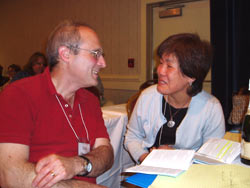
Humans are creatures of habit. Good habits lead to success. Bad habits lead to failure. Institutional bad habits lead to institutional failure. The teaching profession at every level is plagued by bad habits:
- The habit of covering too much content.
- The habit of talking too much.
- The habit of giving students answers to questions they have never asked.
- The habit of covering many more concepts than students can digest.
- The habit of thinking that knowledge can be acquired by “parroting” what teachers say.
- The habit of teaching concepts unconnected with other concepts.
- The habit of teaching as if understanding came from memorizing bits and pieces of fragmented information.
- The habit of teaching concepts isolated from real life contexts.
This session will target these, and other, bad habits, and focus on the good habits that should replace them.
{"id":2586,"title":"Overcoming the Barriers to Disciplining the Mind: Bad Habits of Teaching and Learning","author":"Gerald Nosich","content":"<p><img id=\"__mce\" style=\"float: right;\" src=\"https://www.criticalthinking.org/image/pimage/ppl6.jpg\" alt=\"\" /></p>\r\n<p>Humans are creatures of habit. Good habits lead to success. Bad habits lead to failure. Institutional bad habits lead to institutional failure. The teaching profession at every level is plagued by bad habits:</p>\r\n<ul>\r\n<li>The habit of covering too much content.</li>\r\n<li>The habit of talking too much.</li>\r\n<li>The habit of giving students answers to questions they have never asked.</li>\r\n<li>The habit of covering many more concepts than students can digest.</li>\r\n<li>The habit of thinking that knowledge can be acquired by &ldquo;parroting&rdquo; what teachers say.</li>\r\n<li>The habit of teaching concepts unconnected with other concepts.</li>\r\n<li>The habit of teaching as if understanding came from memorizing bits and pieces of fragmented information.</li>\r\n<li>The habit of teaching concepts isolated from real life contexts.</li>\r\n</ul>\r\n<p>This session will target these, and other, bad habits, and focus on the good habits that should replace them.</p>\r\n<p><br style=\"clear: both;\" /></p>","public_access":"1","public_downloads":"1","sku":"","files":{},"images":{}}
Issues in Critical Thinking
In this session, Richard Paul will lead a discussion that interweaves basic problems and issues, in making sense of critical thinking theory and practice, as follows:
- the problem of concept
- the problem of definition
- the problem of absolutism
- the problem of relativism
- the problem of divergent forms and manifestations of critical thinking
- the problem of content
- the problem of human nature
- the problem of divergent cultures and societies
- the problem of history
- the problem of self-critique
- the problem of egocentrism
- the problem of sociocentrism
- the problem of vested interest
- the problem of prejudice
- the problem of power
- the problem of rationality
{"id":2587,"title":"Issues in Critical Thinking","author":"Richard Paul","content":"<p>In this session, Richard Paul will lead a discussion that interweaves basic problems and issues, in making sense of critical thinking theory and practice, as follows:</p>\r\n<ol>\r\n<li>the problem of concept</li>\r\n<li>the problem of definition</li>\r\n<li>the problem of absolutism</li>\r\n<li>the problem of relativism</li>\r\n<li>the problem of divergent forms and manifestations of critical thinking</li>\r\n<li>the problem of content</li>\r\n<li>the problem of human nature</li>\r\n<li>the problem of divergent cultures and societies</li>\r\n<li>the problem of history</li>\r\n<li>the problem of self-critique</li>\r\n<li>the problem of egocentrism</li>\r\n<li>the problem of sociocentrism</li>\r\n<li>&nbsp;the problem of vested interest</li>\r\n<li>the problem of prejudice</li>\r\n<li>the problem of power</li>\r\n<li>the problem of rationality</li>\r\n</ol>\r\n<p><br style=\"clear: both;\" /></p>","public_access":"1","public_downloads":"1","sku":"","files":{},"images":{}}
Critical Thinking and Classroom Discipline: Strategies for Keeping Students Intellectually Engaged
The primary goal of instruction should be to engage the mind, to cultivate the intellect, and to help students develop their own minds. But it is difficult to teach students to think critically when much of a teacher’s time is spent correcting misbehavior. This session focuses on practical behavior management strategies that increase the opportunities for higher order thinking to take place in the classroom. Furthermore, this session will discuss the importance of implementing long-term plans for cultivating a classroom culture that, over time, increasingly values critical thought. Participants will work with specific tactics and share some of their best strategies in small and large group discussions.
{"id":2588,"title":"Critical Thinking and Classroom Discipline: Strategies for Keeping Students Intellectually Engaged","author":"Enoch Hale","content":"<p>The primary goal of instruction should be to engage the mind, to cultivate the intellect, and to help students develop their own minds. But it is difficult to teach students to think critically when much of a teacher&rsquo;s time is spent correcting misbehavior. This session focuses on practical behavior management strategies that increase the opportunities for higher order thinking to take place in the classroom. Furthermore, this session will discuss the importance of implementing long-term plans for cultivating a classroom culture that, over time, increasingly values critical thought. Participants will work with specific tactics and share some of their best strategies in small and large group discussions.</p>\r\n<p><br style=\"clear: both;\" /></p>","public_access":"1","public_downloads":"1","sku":"","files":{},"images":{}}
Are Critical Societies Possible?

The critical habit of thought, if usual in society, will pervade all its mores, because it is a way of taking up the problems of life. Men educated in it cannot be stampeded by stump orators ... They are slow to believe. They can hold things as possible or probable in all degrees, without certainty and without pain. They can wait for evidence and weigh evidence, uninfluenced by the emphasis or confidence with which assertions are made on one side or the other. They can resist appeals to their dearest prejudices and all kinds of cajolery. Education in the critical faculty is the only education of which it can be truly said that it makes good citizens.
William Graham Sumner, Folkways, 1906
It is becoming increasingly clear that the survival and well-being of humans largely depends on our ability to work together successfully and productively, to reach out to one another, to help one another. Yet, problems of nationalism and ethnocentrism are pervasive across the world. People are raised to see their country, or their group, as better than other countries or groups. They tend to favor the groups to which they belong. This is a natural tendency of the human mind. And it is a tendency fostered within most, if not all, cultures across the world.
If we are to create a world that advances justice for the vast majority of people across the globe, we must become citizens of the world. We must denounce nationalism and ethnocentrism. We must think within a global, rather than national, view. We must take a long-term view. We must begin to relegate the interests of any given country, including our own, to that of one of many: no more worthy, no more needy, no more deserving of the world’s resources than anyone else on the planet. We must see the lives of people in other countries as no less precious than the lives of people in our own country. We must oppose the pursuit of narrow selfish or group interests. Integrity and justice must become more important to us than national advantage and power. This session will focus on these essential ingredients of a critical society and briefly explore the possibilities for the creation of such a society in the future.
{"id":2589,"title":"Are Critical Societies Possible?","author":"Linda Elder","content":"<p><img id=\"__mce\" style=\"float: right;\" src=\"https://www.criticalthinking.org/image/pimage/berk2.jpg\" alt=\"\" /></p>\r\n<blockquote><em>The critical habit of thought, if usual in society, will pervade all its mores, because it is a way of taking up the problems of life. Men educated in it cannot be stampeded by stump orators ... They are slow to believe. They can hold things as possible or probable in all degrees, without certainty and without pain. They can wait for evidence and weigh evidence, uninfluenced by the emphasis or confidence with which assertions are made on one side or the other. They can resist appeals to their dearest prejudices and all kinds of cajolery. Education in the critical faculty is the only education of which it can be truly said that it makes good citizens. </em><br /> <br />\r\n<div>William Graham Sumner, Folkways, 1906</div>\r\n</blockquote>\r\n<p>It is becoming increasingly clear that the survival and well-being of humans largely depends on our ability to work together successfully and productively, to reach out to one another, to help one another. Yet, problems of nationalism and ethnocentrism are pervasive across the world. People are raised to see their country, or their group, as better than other countries or groups. They tend to favor the groups to which they belong. This is a natural tendency of the human mind. And it is a tendency fostered within most, if not all, cultures across the world.<br /> <br /> If we are to create a world that advances justice for the vast majority of people across the globe, we must become citizens of the world. We must denounce nationalism and ethnocentrism. We must think within a global, rather than national, view. We must take a long-term view. We must begin to relegate the interests of any given country, including our own, to that of one of many: no more worthy, no more needy, no more deserving of the world&rsquo;s resources than anyone else on the planet. We must see the lives of people in other countries as no less precious than the lives of people in our own country. We must oppose the pursuit of narrow selfish or group interests. Integrity and justice must become more important to us than national advantage and power. This session will focus on these essential ingredients of a critical society and briefly explore the possibilities for the creation of such a society in the future.</p>\r\n<p><br style=\"clear: both;\" /></p>","public_access":"1","public_downloads":"1","sku":"","files":{},"images":{}}
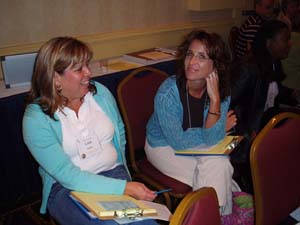
There is nothing we do as humans that does not involve thinking. Our thinking tells us what to believe, what to reject, what is important, what is unimportant, what is true, what is false, who are our friends, who are our enemies, how we should spend our time, what jobs we should pursue, where we should live, whom we should marry, how we should parent. Everything we know, believe, want, fear, and hope for, our thinking tells us. It follows, then, that the quality of our thinking is the primary determinant of the quality of our lives. It has implications for how we go about doing literally everything we do.
No matter what your circumstance or goals, no matter where you are or what problems you face, you are better off if you are in control of your thinking. As a professional, parent, citizen, lover, friend, shopper - in every realm and situation of your life - skilled thinking pays off. Poor thinking, in contrast, inevitably causes problems, wastes time and energy, and engenders frustration and pain.
Becoming a critical thinker requires that you learn to observe, monitor, analyze, assess, and reconstruct thinking of many sorts in many dimensions of human life. It requires building important habits of mind. It has implications for every act that takes place in your mind. It requires a special form of dedication and perseverance, honesty and integrity. It can be done only if taken seriously and pursued throughout a lifetime. This session focuses on some key strategies for using your mind to improve the quality of your life.
{"id":2590,"title":"Transforming Everyday Experience Through Critical Thinking","author":"Rush Cosgrove","content":"<p><img id=\"__mce\" style=\"float: right;\" src=\"https://www.criticalthinking.org/image/pimage/P1010087.jpg\" alt=\"\" /></p>\r\n<p>There is nothing we do as humans that does not involve thinking. Our thinking tells us what to believe, what to reject, what is important, what is unimportant, what is true, what is false, who are our friends, who are our enemies, how we should spend our time, what jobs we should pursue, where we should live, whom we should marry, how we should parent. Everything we know, believe, want, fear, and hope for, our thinking tells us. It follows, then, that the quality of our thinking is the primary determinant of the quality of our lives. It has implications for how we go about doing literally everything we do.<br /> <br /> No matter what your circumstance or goals, no matter where you are or what problems you face, you are better off if you are in control of your thinking. As a professional, parent, citizen, lover, friend, shopper - in every realm and situation of your life - skilled thinking pays off. Poor thinking, in contrast, inevitably causes problems, wastes time and energy, and engenders frustration and pain.<br /> <br /> Becoming a critical thinker requires that you learn to observe, monitor, analyze, assess, and reconstruct thinking of many sorts in many dimensions of human life. It requires building important habits of mind. It has implications for every act that takes place in your mind. It requires a special form of dedication and perseverance, honesty and integrity. It can be done only if taken seriously and pursued throughout a lifetime. This session focuses on some key strategies for using your mind to improve the quality of your life.</p>\r\n<div><a href=\"#top\">BACK TO TOP</a></div>\r\n<p><br style=\"clear: both;\" /></p>","public_access":"1","public_downloads":"1","sku":"","files":{},"images":{}}











